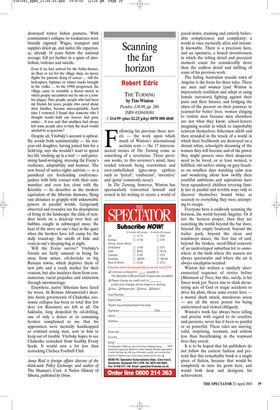Scanning the far horizon
Robert Edric
THE TURNING by Tim Winton Picador, £16.99, pp. 200, ISBN 0330438301 V £14.99 (plus £2.25 p&p) 0870 800 4848 Following his previous three novels — the work upon which much of Winton’s international acclaim rests — the 17 interconnected stories of The Turning come as something of a revelation. Those previous works, to this reviewer’s mind, have tended towards being overwritten and over-embellished (give-away epithets such as ‘lyrical’, ‘exuberant’, ‘inventive’ and ‘gutsy’ commonly recur).
In The Turning, however, Winton has spectacularly reinvented himself and reined in his writing to create a world of pared-down, stunning and entirely believable completeness and complexity; a world at once exotically alien and instantly knowable. There is a precision here, and an openness, a honed inventiveness in which the telling detail and prescient moment count for considerably more than the endless detail and infilling of some of his previous work.
The failing Australian seaside town of Angelus is the focus for these tales. There are men and women (and Winton is impressively confident and adept at using female narrators) fighting against their pasts and their futures, and bridging the abyss of the present on their journeys to yearned-for better lives: women clinging to violent men because men elsewhere are not what they know; school-leavers imagining worlds in which to improbably reinvent themselves; fishermen adrift and then stranded in the wrack of a world in which their livelihoods are destroyed on a distant whim; schoolgirls dreaming of the women they will become and of the power they might possess once their desperate need to be loved, or at least noticed, is fulfilled; old surfers sitting on grey beaches on windless days watching calm seas and wondering about how swiftly their youthful ambitions and aspirations have been squandered; children severing family ties in painful and terrible ways only to discover themselves bound twice as securely to everything they were attempting to escape.
Everyone here is endlessly scanning the horizon, the world beyond Angelus. Or if not the horizon proper, then they are searching the world beyond the bar door, beyond the empty boatyard, beyond the trailer park, beyond the clean and windswept dunes, the first line of surf, beyond the broken, weed-filled concrete of an undeveloped suburban lot to somewhere in the bush where the sunsets are always spectacular and where the air is always eucalyptus-scented.
Winton has written a similarly interconnected sequence of stories before (Minimum of Two), but this, surely, is his finest work yet. Never one to shirk devastating acts of God or tragic accidents to drive his plots, those same events here a mortal shark attack, murderous arson — are all the more potent for being understated and viewed obliquely.
Winton’s work has always been telling and precise with regard to its cruelties and passions; never has it been so painful or so powerful. These tales are moving, solid, surprising, resonant, and seldom less than breathtaking in the wayward lives they reveal.
It is to be hoped that his publishers do not follow the current fashion and pretend that this remarkable book is a single piece of fiction, because that would be completely to miss his point here, and would both deny and denigrate his achievement.



















































 Previous page
Previous page